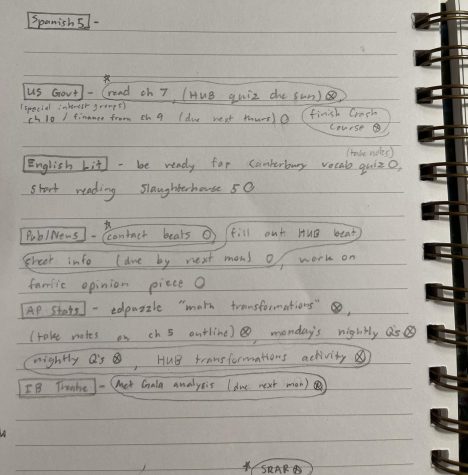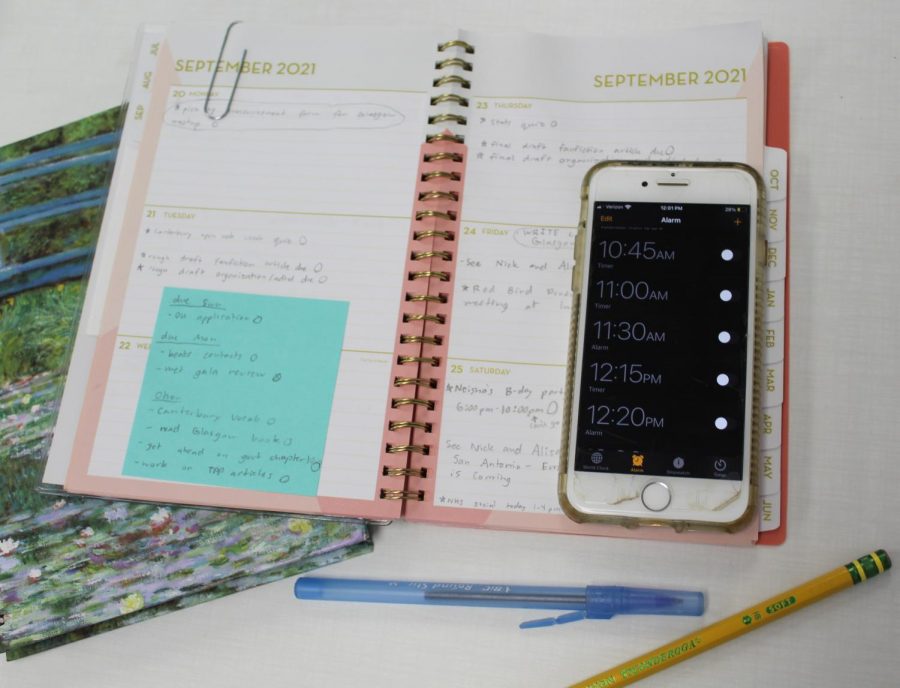Your donation will support the student journalists of Bellaire High School. Your contribution will allow us to purchase equipment and cover our annual website hosting costs.
Organization Tips from an ADHD Student
Oct 17, 2021
A little girl is sitting at her class desk reading a book. To her, the rest of the world has faded to a dull buzz and time slips by without notice. Suddenly, she hears the teacher ask “Does anyone have a question?” and she snaps her head up in a panic. She missed the whole lesson, and an ugly combination of shame and embarrassment tightens her throat as she thinks of how she’ll possibly catch up.
The rest of her day doesn’t go much better. She’s not a bad student, but she loses focus easily. She forgets things in her locker, she doesn’t hear the teacher’s instructions and she gets books confiscated by teachers often. The effort is certainly there. Teachers say she could be Gifted and Talented if only she was more focused, but her grades reflect her scatteredness.
Before the 4th grade, that little girl was me. I tried my best in school, and the people around me were always supportive, but they didn’t know how to help me. It wasn’t until I was diagnosed with ADHD (Attention Deficit/Hyperactivity Disorder) that everything fell into place.
What is ADHD?
My favorite explanation of ADHD is that it is not an inability to focus, but a lack of consistent focus. When I find a topic I’m passionate about, like creative writing or the latest Marvel movie, I can talk for hours without getting off track, but when confronted with a mundane activity like housework, I can be easily distracted. I have good intentions but a hard time following through.
Similarly, where ADHD students like me tend to struggle is the ability to focus on a task for long durations of time or to stay organized enough to follow through on multiple tasks at once.
Over the years, I have worked to develop ways to adapt to my ADHD brain’s needs, finding methods to cope and thrive in both my academic and personal life. I fall on the inattentive side of the ADHD spectrum (as opposed to the hyperactive or impulsive side) but you don’t have to have a learning disorder for my advice to be of use. What follows is a list of some of the most useful tips I have learned about organization.

- Always, always have a way to write important things down, especially school assignments.When I was first encouraged to use an agenda, keeping up with it felt like a hassle, but now I see it as a lifeline. I would be lost without my planners. I use a daily planner where I write assignments, and a weekly planner where I write deadlines. Next to each assignment I put a little circle. When I finish the task I put one slash through it, and when I turn it in I put a second slash through it, making an “x”. That way, I always know what assignments are done, and what I still need to follow through on in some way.
- Try to develop a system that works for you, and that you know you can follow.
There is no one-size-fits-all method to staying organized. Structure often has to be personalized in order for it to stick and become a habit. For example, I used to write reminders to myself on sticky notes and use them as bookmarks. When I reached for a book, I’d be reminded of the tasks that needed to be done first. This method worked for me because I am a reader, but someone who hates to read might be better off putting their reminders somewhere other than between the pages of a book. I also write on my wrist in pen ink, and on the notes section of my phone. Setting alarms can also be a big help. Find methods that make sense to you, and use them. - Try to break long lists down into categories.
When a list is too long, you might feel overwhelmed and struggle to start any task, leading to procrastination and excessive stress. Breaking things down by category (ex. school tasks vs personal tasks) or by deadline (with the most pressing issues first) can be a serious stress reliever. Five minutes dedicated to organization can be worth a half hour of sporadic, unorganized work. Plus, knowing exactly what you need to do and when can take a lot of the pressure off your shoulders. Instead of always worrying that you’ve forgotten something, when you’ve finished your tasks for the day you can relax guilt-free. - Choose your study music carefully (if you listen to it at all)
As someone who is prone to distraction, music can sometimes keep me from focusing. I get wrapped up in the story and end up on a tangent that leads me to an hour long YouTube spiral where no work gets done. On the other hand, after my meds wear off, sometimes putting on some relaxed country music can be the push I need to stay motivated and complete the task in front of me. Sometimes, one consistent unchanging distraction is better than giving my thoughts room to wander. Take note of which scenario sounds more like you, and keep this in mind when choosing your tunes. - If you have 504 accommodations, don’t be ashamed to use them.
I used to wrestle with this one a lot. As a straight-A student and a perfectionist, I felt guilty about needing an extra boost to keep up with my classmates. It’s important to keep in mind that everyone’s brains work differently, and that education isn’t one-size-fits-all. If you have accommodations, they are there for a reason- to help you get the most out of school without penalty for learning differently.

Karelly • Dec 8, 2021 at 11:53 am
I was really interested by this article because I myself have ADHD. I knew I had ADHD since 3rd grade but my parents were opposed to believing in the existence of mental disorders. I would spend hours and hours on a ten minute assignment and it frustrated me so much. As for my hyperactivity, I’ve gotten detention countless times due to my impulsiveness and inability to shut up. ADHD symptoms are much harder to find in women than in men which made things even harder for me. After years of convincing my parents, I had to take a 6 hour test in MD Anderson just to confirm my ADHD. And as for your tips, I totally agree with the planner and reminder thing. Sadly my thoughts rush out of my head extremely fast so I write EVERYTHING on my palm. It’s messy but it’s extremely effective for me. I hope to learn how the ADHD medication has affected you because for me the medication changed my life SO MUCH for the better, though many say they despise their medication.
Trinity • Jan 28, 2022 at 12:24 pm
Hi Reader! I’m sorry to hear getting diagnosed took so long, but I’m glad you’re doing better. I was very lucky to be diagnosed early in life, I had attentive teachers and understanding parents. I write on my hand sometimes too when I have something time sensitive I need to remember (like club meeting times and afterschool commitments.) I could probably write a whole other article about my experience with meds, but in brief, they changed my life for the better too. I’ve also known people who had very negative experiences with meds- every body is different. But mine, despite the downsides, have overall been a huge blessing.